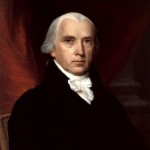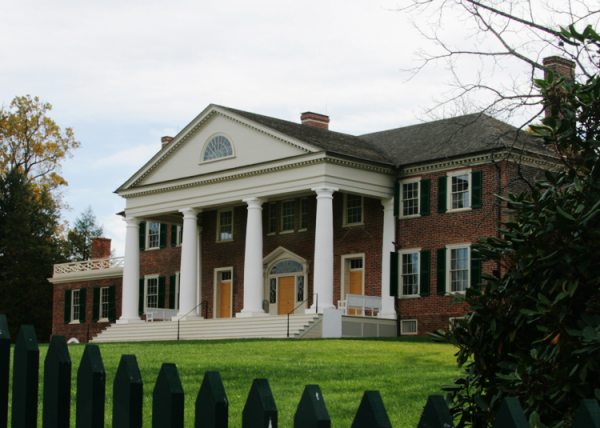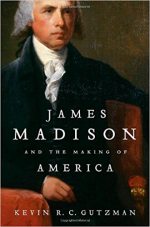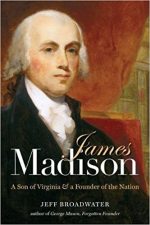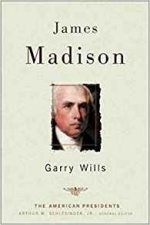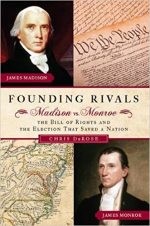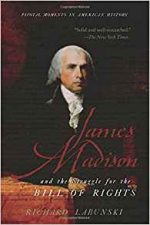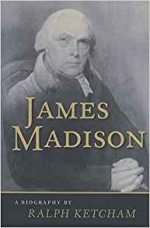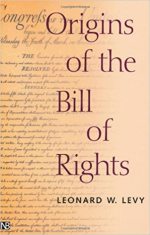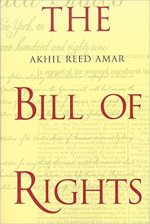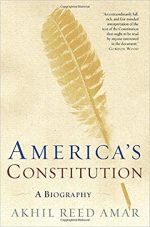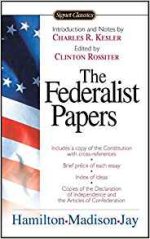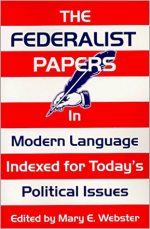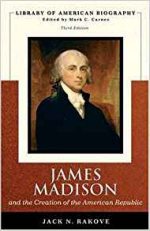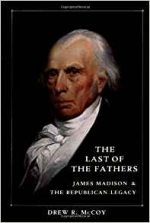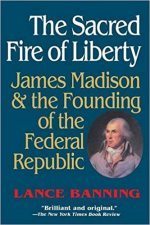Since the general civilization of mankind, I believe there are more instances of the abridgement of freedom of the people by gradual and silent encroachments by those in power than by violent and sudden usurpations.
–James Madison, Speech in the Virginia Ratifying Convention on Control of the Military, June 16, 1788 in: History of the Virginia Federal Convention of 1788, vol. 1, p. 130 (H.B. Grigsby ed. 1890). (Google Books)
James Madison, 4th President of the United Sates, is known as “Father of the Constitution” and (together with George Mason) “Father of the Bill of Rights” (1751-1836). (His second cousin was also named James Madison, the Right Reverend James Madison (1749-1812), who became the eighth president of the College of William and Mary.)

Born March 16, 1751, Madison was brought up in Orange County, Virginia, and attended Princeton (then called the College of New Jersey). A student of history and government, well-read in law, he participated in the framing of the Virginia Constitution in 1776, served in the Continental Congress, and was a leader in the Virginia Assembly.
When delegates to the Constitutional Convention assembled at Philadelphia in 1787, the 36-year-old Madison took frequent and emphatic part in the debates.
Madison made a major contribution to the ratification of the Constitution by writing, with Alexander Hamilton and John Jay, the Federalist Papers. In later years, when he was referred to as the “Father of the Constitution,” Madison protested that the document was not “the off-spring of a single brain,” but “the work of many heads and many hands.”
In Congress, he helped frame the Bill of Rights and enact the first revenue legislation. Out of his leadership in opposition to Hamilton’s financial proposals, which he felt would unduly bestow wealth and power upon northern financiers, came the development of the Republican, or Jeffersonian, Party.
Source: James Madison – White House
When James Madison’s second term as president ended in 1817, he and Dolley retired to Montpelier. In retirement Madison stayed active and interested in politics. In 1819 he founded the American Colonization Society dedicated to freeing slaves and transporting them to the West Coast of Africa. Madison served on the board of visitors at the University of Virginia, and briefly came out of retirement at the age of 79 to attend the 1829 Virginia Constitutional Convention. On June 28, 1836, James Madison died at Montpelier at the age of 85 and was buried in the Madison Family Cemetery on the mansion grounds.
Source: “James Madison: Retirement and Death,” James Madison’s Montpelier
Richard Brookhiser – James Madison, Father of American Politics
C-Span’s “James Madison and the Constitution”
Books
- “James Madison and the Making of America,” by Kevin Gutzman
- “James Madison: A Son of Virginia and a Founder of the Nation,” by Jeff Broadwater
- “James Madison,” by Garry Wills
- “James Madison,” by Richard Brookhiser
- “Founding Rivals: Madison vs. Monroe, The Bill of Rights, and The Election that Saved a Nation,” by Chris DeRose
- “James Madison and the Struggle for the Bill of Rights,” by Richard Labunski
- “James Madison: A Biography,” by Ralph Ketcham
- “Origins of the Bill of Rights,” by Leonard W. Levy
- “The Bill of Rights: Creation and Reconstruction,” by Akhil Reed Amar
- “America’s Constitution: A Biography,” by Akhil Reed Amar
- “The Federalist Papers,” by Alexander Hamilton, James Madison, and John Jay
- “The Federalist Papers In Modern Language: Indexed for Today’s Political Issues,” by Mary E. Webster
- “James Madison and the Creation of the American Republic,” by Jack N. Rakove and Oscar Handlin
- “The Last of the Fathers: James Madison & The Republican Legacy,” by Drew R. McCoy
- “The Sacred Fire of Liberty: James Madison and the Founding of the Federal Republic,” by Lance Banning
- “James Madison and the Spirit of Republican Self-Government,” by Colleen A. Sheehan
- “A Colored Man’s Reminiscences of James Madison,” by Paul Jennings, J. B. R.
Montpelier is located at 13384 Laundry Rd, Montpelier Station, VA
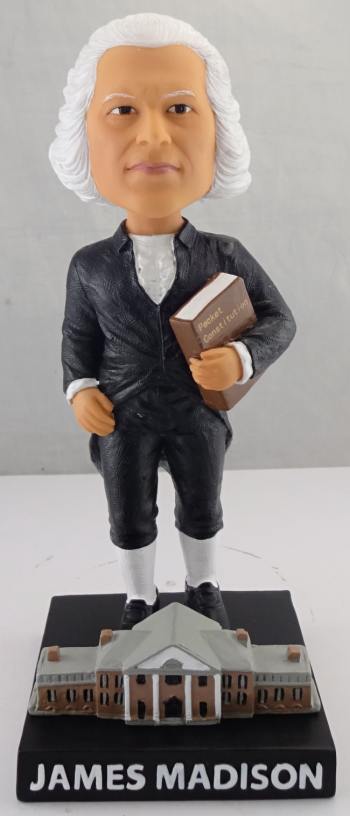
James Madison Bobble Head
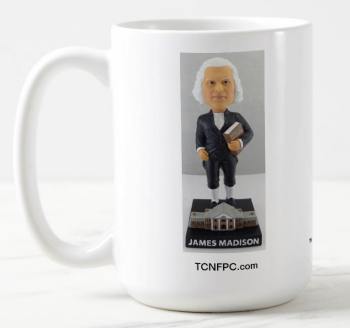
James Madison Bobblehead MUG, from Zazzle
More
- James Madison, Wisdom and Warnings
- George Mason
- The Center for the Constitution at James Madison’s Montpelier
- James Madison’s Montpelier
- American President: James Madison (1751–1836) – The Miller Center at the University of Virginia
- James Madison – Wikipedia
- James Madison – White House
- James Madison at Wikiquote
- James Madison Quotes at Notable Quotes
- James Madison – Internet Public Library
- The James Madison Papers, 1723-1836 – Library of Congress
- Federalist Papers Authored by James Madison
- “Memorial and Remonstrance Against Religious Assessments (1785)”
- James Madison Memorial Fellowship Foundation
- “A President Oft-Overshadowed,” by Carl Rollyson, The Wall Street Journal, March 24, 2012
- List of Presidents of the United States – Wikipedia
- What did Madison really think of the states? Is it true states are laboratories of democracy?, by Steve Eide, September 19, 2013
- James Madison Anticipates the Possibility of Government Shutdown–and Predicts that the House of Representatives Can and Should Prevail, by Nick Rosenkranz, October 10, 2013
- Montpelier Restored: Notes on a recent visit to James Madison’s estate, by Myron Magnet, March 12, 2014
- “‘Marbury v. Madison Returns’! The Supreme Court Considers the Scope of ‘Judicial Power’,” CRS Legal Sidebar LSB10059 (4-page PDF
 )
) - “James Madison Understood Religious Freedom Better than Jefferson Did,” by Steven Waldman, May 20, 2019
- “Madison’s Consistency on the Bill of Rights,” by Michael P. Zuckert, National Affairs, Spring 2021
- “The Contradictions of James Madison, Our First National Politician,” by Sam Negus, National Review, January 6, 2022
James Madison and the Making of America
James Madison: A Son of Virginia and a Founder of the Nation
James Madison
James Madison
Founding Rivals: Madison vs. Monroe, The Bill of Rights, and The Election that Saved a Nation
James Madison and the Struggle for the Bill of Rights
James Madison: A Biography
Origins of the Bill of Rights
The Bill of Rights: Creation and Reconstruction
America’s Constitution: A Biography
The Federalist Papers
The Federalist Papers In Modern Language: Indexed for Today’s Political Issues
James Madison and the Creation of the American Republic
The Last of the Fathers: James Madison & The Republican Legacy
The Sacred Fire of Liberty: James Madison and the Founding of the Federal Republic
James Madison and the Spirit of Republican Self-Government
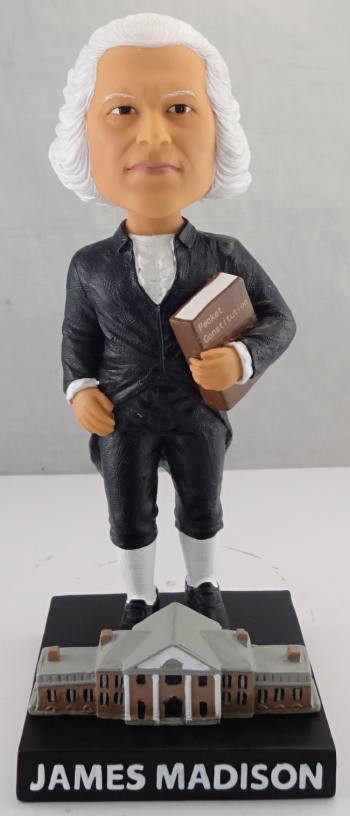
James Madison Jr. (March 16, 1751 – June 28, 1836) was an American statesman and Founding Father who served as the fourth President of the United States from 1809 to 1817. He is hailed as the “Father of the Constitution” for his pivotal role in drafting and promoting the United States Constitution and the Bill of Rights.
Born into a prominent Virginia planting family, Madison served as a member of the Virginia House of Delegates and the Continental Congress during and after the American Revolutionary War. In the late 1780s, he helped organize the Constitutional Convention, which produced a new constitution to supplant the ineffective Articles of Confederation. After the Convention, Madison became one of the leaders in the movement to ratify the Constitution, and his collaboration with Alexander Hamilton produced The Federalist Papers, among the most important treatises in support of the Constitution.
The historian Garry Wills wrote, “Madison’s claim on our admiration does not rest on a perfect consistency, any more than it rests on his presidency. He has other virtues. … As a framer and defender of the Constitution he had no peer. … The finest part of Madison’s performance as president was his concern for the preserving of the Constitution. … No man could do everything for the country—not even Washington. Madison did more than most, and did some things better than any. That was quite enough.” (James Madison: The American Presidents Series: The 4th President, 1809-1817, by Garry Wills.)
For more than 40 years, TheCapitol.Net and its predecessor, Congressional Quarterly Executive Conferences, have been teaching professionals from government, military, business, and NGOs about the dynamics and operations of the legislative and executive branches and how to work with them.
Our custom on-site and online training, publications, and audio courses include congressional operations, legislative and budget process, communication and advocacy, media and public relations, testifying before Congress, research skills, legislative drafting, critical thinking and writing, and more.
TheCapitol.Net is on the GSA Schedule, MAS, for custom on-site and online training. GSA Contract GS02F0192X
TheCapitol.Net is now owned by the Sunwater Institute.
Teaching how Washington and Congress work ™

